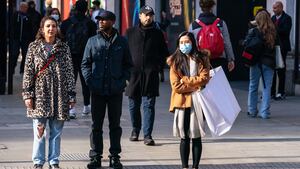After a devastating few months, the latest COVID surge is easing across much of the world. But while most countries are getting better, Russia is actually getting worse.
And for one main reason. “A significant percentage of Russians fear the vaccine more than the virus,” Anna Gotlib, a Russian-born philosopher and bioethicist at Brooklyn College, told The Daily Beast.
And the Russian government, rather than battling vaccine skepticism, has actually encouraged it. All in the hope of scoring a quick buck and owning the West.
Globally, authorities counted around 3 million new coronavirus infections last week—down from 4.6 million at the peak of the surge in early September. Deaths are declining, too. There were 49,000 COVID deaths last week, down from 69,000 six weeks ago.
In Russia, however, the trends are heading in the opposite direction, based on even the most conservative official figures. On Wednesday, the country of 146 million people set all-time official records for daily cases (around 36,000) and deaths (nearly 1,100).
And it’s possible the actual numbers are worse than the official ones. Critics have credibly accused Moscow of cooking the books in order to downplay the seriousness of the crisis and insulate the government from criticism.
“There’s a gap between reported and real COVID-19 cases and mortality everywhere, but based on comparisons of numbers of deaths in 2020 to 2021 with previous years, that gap is wider in Russia—and some other post-socialist countries—than anywhere else in the world,” Judy Twigg, a professor of political science at Virginia Commonwealth University, told The Daily Beast.
The pandemic is so bad in Russia right now that the Kremlin, which for months resisted mandating commonsense public health measures, ordered a 10-day partial lockdown in Moscow starting Thursday. But the lockdown is a band-aid on a gaping—and largely self-inflicted—wound.
Despite being the first country to release a COVID vaccine and make it freely available to residents, Russia is one of the least-vaccinated developed countries. Just 33 percent of the population is fully vaccinated, compared to 58 percent in the United States, 68 percent in the United Kingdom and 74 percent in Canada.
Misinformation, much of it officially sanctioned, has turned millions of Russians against vaccines while also eroding trust in their leaders. “Misinformation has always been a huge factor in Russia, and in the era of the internet and social media, misinformation has taken such a hold that I am not sure whether it is even possible for those without access to non-Russian media to distinguish between what is true and what is, in fact, propaganda,” Gotlib said.
The confusion can manifest as a deep reluctance to follow health guidelines. “Among some people,” Twigg said, “there's a general sense that if the government is telling us to do this thing—get vaccinated—then it can't possibly be a good idea.”
It doesn’t help that the Kremlin rushed development of the first of three locally made vaccines and pushed it on the population without also showing good trials data, all in the interest of being first in the vaccine race. When it comes to the Sputnik V vaccine, you don’t have to be misinformed to be skeptical.
It’s a perfect storm. An untrustworthy government pushing an unproven vaccine on a hesitant populace, and then refusing to take any other action until COVID spiraled out of control. If you think Washington’s response to the pandemic has been fractious, uneven, and inadequate, consider that Moscow has consistently done pretty much everything wrong. And now everyday Russians are suffering.
Like most countries, Russia has endured several waves of COVID. There was that initial surge in the spring of 2020, of course. And then another much worse surge that winter. Cases and deaths dropped this spring then started rising again in the fall as new variants of the SARS-CoV-2 virus became dominant.
Things are different in Russia. New cases and deaths are still rising, months after the fall surge began. Plus, the ratio of deaths to cases is much higher than in other well-off countries.
It’s not hard to understand why. A lower vaccination rate means infected Russians as a population aren’t protected against the worst outcomes—severe illness, hospitalization, even death—the same way people in better-vaxxed countries are.
“The initial problem was Russia’s desire to ‘win’ the vaccine race,” Gotlib explained. Russian regulators approved the two-dose Sputnik jab—which uses the human adenovirus as a vector— for widespread use in August 2020 after it had been tested on just 38 people. A larger, phase 3 trial was still underway.
The U.S. Food and Drug Administration was, at the time, still four months from greenlighting the first fully tested vaccine, the two-dose messenger-RNA jab from Moderna. For Moscow, being first appeared to be the whole point. The Russian government compared the Sputnik vaccine to the Sputnik satellite, which in 1957 became the first manmade object to orbit Earth.
The Sputnik vaccine would change the world’s perception of Russia, just like the satellite did 63 years earlier, claimed Kirill Dmitriev, whose Russian Direct Investment Fund bankrolled Moscow’s vaccination campaign. “For countries, it’s difficult to acknowledge that: ‘How is it possible that Russia, which has been always shown as this backward, authoritarian country, can do this?’” Dmitriev said.
Dozens of countries inked expensive deals with Russia to acquire the Sputnik vaccine, sight unseen. But production fell far short of projection. More than one country canceled its contract after deliveries failed to arrive.
The vaccine’s developers at the Gamaleya Research Institute in Moscow eventually posted what it said were results from large-scale trials involving more than 20,000 volunteers. The vaccine is 92 percent effective, the institute claimed.
But in defiance of the usual rules of medical research, Gamaleya never released the raw data from the trials. This seeded doubt in the minds of many scientists that has lingered even as independent studies have indicated that Sputnik is safe and reasonably effective.
Gamaleya declined an interview request on the basis that The Daily Beast is “overly biased in its coverage of Russia.”
Twigg described Sputnik as “a solid product.” But that’s now beside the point. “Premature and exaggerated claims are a huge part of the lingering skepticism about Sputnik V, both in Russia and internationally,” he said. The most recent major poll, from the Moscow-based Levada Center in September, found that just 14 percent of Russians were willing to take a Russian vaccine.
Russia’s leaders didn’t just push an untested vaccine. They also maligned competing vaccines in order to boost Sputnik V’s market share. Many Russians rejected Sputnik V for a lack of transparency regarding the jab. Then they rejected Western vaccines because the government insisted they were unsafe.
“Possibly this has come to bite them back home,” Peter Hotez, an expert in vaccine development at Baylor College, told The Daily Beast. Moscow banked on Russians believing in Sputnik. But they don’t—and they don’t trust any other vaccines, either. Now the world’s ninth most populous country is wide open to ever-more-dangerous coronavirus variants.
That vulnerability is most evident not in cases, but in deaths. When the Delta variant became dominant in the United States over the summer, it fueled a spike in cases that peaked at 280,000 new infections in a single day on Aug. 30. That was just 20,000 fewer cases than the USA’s worst day ever for COVID—300,000 new infections on Jan. 8.
But America’s vaccine uptake, middling though it may be owing to right-wing resistance, has been sufficient to build a wall of immunity. Not against all infections, necessarily, but against serious infections resulting in hospitalization or death.
Cases during the worst days of the summer surge nearly matched the worst days of the winter surge, but deaths were proportionally lower. Nearly 5,500 Americans died of COVID on the worst day this winter, Feb. 12. Just 3,400 died on Sept. 16, the worst day of the current surge.
Russia failed to build that wall of immunity. So when infections spiked, deaths also spiked—and just as badly. And it’s entirely possible that the government is hiding the true severity of the problem. The official figures are bad—record cases and deaths this month—but the unofficial figures are even worse.
The Kremlin has reported around 230,000 total COVID deaths. But Alexey Raksha, an independent demographer, scrutinized the data on “excess mortality”—that is, deaths above what you’d expect based on historic trends—and identified an additional half-million deaths that could be COVID-related, according to The Washington Post.
The harm that Russia’s leaders and institutions are inflicting could linger long after COVID has been eradicated or suppressed. “The long-term destruction of basic citizenship structures that occurs when trust is destroyed is very damaging for any society,” Ruth Groenhout, a professor of health-care ethics at the University of North Carolina, told The Daily Beast.
“Citizens need to be able to trust that their political leaders tell the truth, provide them with accurate information and give them sufficient evidence so that the citizens can judge their own needs safely,” Groenhout added. “And the destruction of that trust, unfortunately, causes long-term damage that can take generations to restore.”








